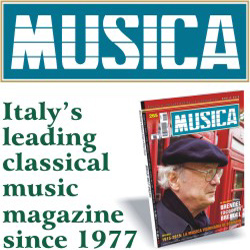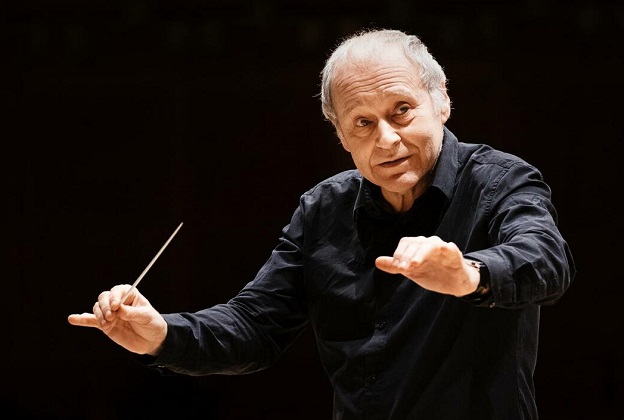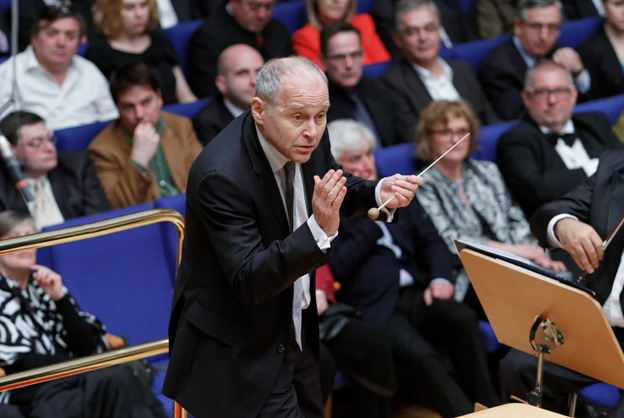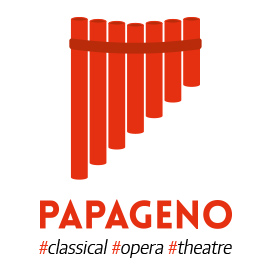Adam Fischer doesn’t spend much time at the sound engineer’s desk, he’s not interested in working at the editing table, but in being on the podium with the orchestras he works with, because they know each other very well. Being the Lifetime Achievement Award winner of the International Classical Music Awards (ICMA), he sat down to talk with Csabai Máté from the Hungarian Jury member Papageno about recording and his favorite composers.
Congratulations on your Lifetime Achievement Award! The oeuvre is not small even if you only look at the recordings you made.
Now comes the question as to how I feel about the award, right? It would be nice, but I prefer to look to the future rather than the past. I’m over the past. I don’t like listening back to my recordings again either because all I keep hearing is what I didn’t do right. It’s better not to hear them. But the future! That excites me much more. Soon I’ll start recording a bunch of Haydn symphonies again, so let’s say I get to live twice, because I’ve already recorded them all once. Of course, what the ICMA Lifetime Achievement Award means is that people enjoy what I do, and this thought makes me feel a bit better. I feel like working.
Did you ever count how many records you have made?
No. There are some I don’t even know about. In the 80s, Hungarian record company Hungaroton did so-called ‘contract work’ for CBS because it was cheaper to record in Budapest than in the West. Normally it’s good if the name of the performers and the conductor written on the recordings, but sometimes that’s not the case. We made them and then never saw them again.
Do you have a memory of holding your first-ever record with your name on it?
Of course! The year was 1976. We recorded a Haydn album, released by Hungaroton in Budapest, with two symphonies, symphonies No. 88, and 100. I was twenty-six years old and I had just met the lady who later became my wife. My sister-in-law, or rather the woman who later became my sister-in-law, commented that I hadn’t shaved properly for the photo. Since then I have had a white beard so it doesn’t show much when I’m unshaven. So old age has its own benefits, you see.
Did you listen to records as a child?
I was twelve or thirteen when my father bought us our first record player. It was a big event and a great luxury. At that time, only one neighbor had a TV set and everyone around would go over to watch it. We didn’t have many records, what we had we would listen to over and over again. Carefully though because, as they said it, with every playback the bakelite would deteriorate. Vivaldi’s concerto for two violins, Bach, excerpts from The Magic Flute, and later A Midsummer Night’s Dream. However, my most memorable musical experiences occurred when we went to the Opera where we bought tickets to the nose-bleed section every night for a mere three forints fifty.
In an old interview from 1981, you said that in the case of operas, making a recording was a necessity, but listening to it live is the real thing.
Indeed. If you look at my discography, I have recorded far fewer operas than concert-hall repertoire pieces. The stage is inseparable from the opera, it is part of musical realization. It’s good when the director, and the conductor are on the same page. Othello should rage in jealousy when the orchestra pit rumbles, and he should be in a good mood when the music is in a good mood. If you only listen to the record, you don’t understand why the tempo would accelerate, when someone on stage is approaching with a murderous dagger. The sight must give meaning to the music, and the music must give meaning to the sight. Therefore, you can’t judge an opera performance just from the recording itself.
You have often expressed regrets for the complete edition of Haydn symphonies recorded with the Austro-Hungarian Haydn Orchestra saying you would have done them differently. How so?
This is a big question! Toscanini said that “where there is a quarter note, there should be a quarter note, where there is a half note, there should be a half note, and not three quarter notes”. He expected to hear the very notes the composer had written. But I believe that in the case of the composer giving indications this is also a necessity. Haydn didn’t not write down instructions for the performers, he gave them freedom to perform the piece to their liking. But he did not prohibit them.
If we don’t take advantage of this opportunity we will falsify music. On my early Haydn recordings, we didn’t take advantage of these possibilities, the beaten notes, the short notes, the empty strings, the drums – everything that makes the music come alive. Not to mention the tempo changes that are instinctive for a solo pianist but harder to do with an orchestra of forty or fifty musicians. For a long time I was afraid to handle the tempo, but now I feel that orchestral music needs the same freedom and desire to communicate as an instrumental soloist would.
It’s as if in the 20th century, with the arrival of sound recording, the idea emerged that every play has to have an ideal performance, right? In Haydn’s time, however, there were no sound recordings that could later be measured against each other. There was only the present moment in music.
Since the arrival of sound recordings musicians have become more cautious. It’s like when the judge warns the accused: every word he says can be used against him. Well, in this case, you have to speak more carefully. Mahler even rearranged Beethoven, and most conductors also did the same. They were more involved with of the performance. They did not think that their most important task was loyalty.
If we don’t owe loyalty to the composer, what do we owe him?
Sorry, but loyalty that only follows the notes is false. A Shakespeare performance in which a machine voice recites the verses, with little expression but to the letter, is not authentic. Shakespeare is authentic when each actor performs it slightly differently, according to his or her own personality. Music is much freer than people think. I don’t know if it is possible to interpret a musical composition “neutrally”. Some people may like it but it is certainly self-deception to think that it will make it good.
If you could have dinner with Haydn, what would you ask him?
I don’t think we would be talking about music. I might ask him if he were afraid that to send someone sheet music, knowing it may be misinterpreted. But I guess he wouldn’t care that much. Some of his letters do contain a few admonitions to performers but they are not typical.
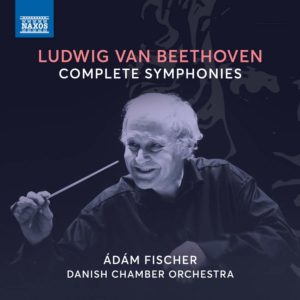 In 2020, Naxos Records released a five-disc set of Beethoven symphonies with you conducting the Danish Chamber Orchestra This recording won an ICMA award in the category Symphonic Music. It’s difficult to make these often-heard works sound like something new, yet, when listening, I felt like the Viennese audience of the time when they were struck by the novelty of the works. What is the secret?
In 2020, Naxos Records released a five-disc set of Beethoven symphonies with you conducting the Danish Chamber Orchestra This recording won an ICMA award in the category Symphonic Music. It’s difficult to make these often-heard works sound like something new, yet, when listening, I felt like the Viennese audience of the time when they were struck by the novelty of the works. What is the secret?
You can’t tell a joke five time because people would already know it and nobody would laugh. But we have to make sure that what was a surprise then is a surprise now. There is no recipe for this and I don’t have a solution for this either. Only with the slogan that “it is not the performance that needs to be reconstructed but the effects it had”.
Beethoven was truly obsessed, his deafness led him to rely solely on how music sounded in his head. He didn’t care much about rehearsal and didn’t mind if musicians told him that something wasn’t possible. His will carried him through fire and water because he had a vision. There are lines in Beethoven’s scores where what is written down is not what was meant to be, if everything were to be played as written in the score. In the second movement of Symphony No. 9, when the woodwinds play a melody and the strings play a rhythm taken from the timpani, the score says: tutta forza. That’s all very well but when played at full blast, the woodwinds are inaudible but when played softly, the momentum gets lost. Nowadays I’ve been doing this, I start the part on fortepiano, and when it is repeated for the fifth time, the strings can play more boldly and the audience will hear the repetition better.
Why is Mahler significant to you?
The reason why I have been pushing for recording Mahler symphonies with the Düsseldorf Symphony Orchestra is because I am convinced that an orchestra that plays mostly operas is stimulated and motivated by playing great symphonic works. It was a stroke of luck, the musicians were really enthusiastic. Now it looks like I can tackle the great Viennese composers, recording all the Schubert symphonies with the Düsseldorf Symphony Orchestra, and the four Brahms symphonies with the Danish Chamber Orchestra.
The last movement of Mahler’s Symphony No. 9 ends in silence after the last note – according to the instruction: ersterbend – has to die.
The last movement of the Symphony No. 9 has been different for me since the death of my parents. No other musical composition depicts dying more poignantly and authentically than this. Of all the languages I know, German is the only one in which the words ‘die’ (sterben) and ‘death’ (der Tod) have nothing to do with each other. It is the process where life fades away and everything slows down, time becomes infinite, and there is a long moment when the dying person is still alive but seems to be dead. Or we think he’s alive, but he’s not. Mahler captured this liminal situation beautifully, but I wouldn’t wish anyone to experience it with a relative, as I did.
The careers of Haydn, Beethoven, and Mahler are closely linked to Vienna, as is yours, having conducted hundreds of performances at the Vienna State Opera. What is the Viennese dialect about?
In connection with the Viennese dialect, I usually talk about the Walzer. They say you have to put stress on three and bring two forward a little bit without stress. But that doesn’t mean anything happens. A dialect cannot be described, no one can speak in a dialect according to a description. The musical stresses depend on the melody, the dynamics of the fluctuation. There are a few principles to grasp, but if you don’t know the ins and outs, it’s forbidden to get involved. I think it’s better to let go of what doesn’t go by itself.
When you make a recording, how much time do you spend in the recording engineer’s room?
As little as possible! After all, I’ve already said that I don’t like listening back to my own recordings. Maybe this is not the right attitude… I’m going to Copenhagen in the next few days to hear a recording of Brahms’ Symphony No. 4, so maybe I should sit in and listen it back. But what if it depresses me? Then the next session will not be good…
Do you also not keep track of how many cuts are made in a recording?
No. If we are making a live recording, we play the concert three times and correct a few details in the next session according to the music director’s instructions. And in the case of studio recordings – the Beethoven cycle was a studio recording – we record the work in parts, but I don’t want to know how exactly the final version is cut.
And what will the Brahms cycle be like?
As it happened, Brahms avoided me for a long time, or rather, I avoided Brahms, because I worked for years in Bayreuth and then at the Wagner Days in Budapest, and so I myself got caught up in the 19th century war between Wagnerians, and Brahmsists. Maybe it’s not a bad thing that I’m late, because Brahms was a late bloomer too, but now he seems very important to me. It’s just a pity that he didn’t write opera, because everything in his music is so operatic.
Opera-like? Extreme, passionate?
It is as if he is disciplined, yet always passionate. I don’t like it when the emotions in his music are repressed. At least I won’t. He wrote the final movement of the Symphony No. 4 in passacaglia form, because he went back to Bach, who was a much more important forerunner for him than Beethoven. But despite the classical form, it is very rhapsodic and romantic. It’s a good question of how much I’m allowed to play with the tempo, but I’ve solved that, too. I will change the tempo so that the listener feels that the tempo is maintained. Here we are again…
Saying that impact is important.
Yes.
So will this be like the Beethoven cycle?
This one will be wilder. We play wild with the Danish Chamber Orchestra, and I’m lucky because the pieces they play with me are not performed with another conductor. We have found each other perfectly. I would not dare to try the solutions we use with them elsewhere. It would sound bad. The members of the Danish Chamber Orchestra know my style well, so well that sometimes they say to me: “You did that better two years ago”, “You did this differently last time”! So it’s not my Brahms, it’s our Brahms.







